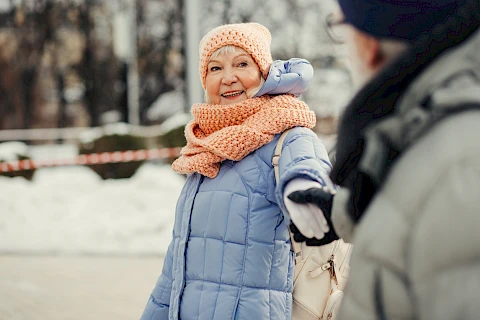
As the winter months approach, it's vital to ensure the safety and well-being of seniors. Winter —even in southern Florida—poses challenges such as cooler temperatures, wet conditions, and increased health risks. Caregivers need to understand these challenges to provide the best care.
Fall Prevention
Preventing falls is a top priority during the winter months. Seniors are at a greater risk of slipping indoors or out, especially when slick conditions are present. By taking a few precautionary steps, you can create a safer environment both inside and outside the home.
- Use permanent, non-slip flooring. This can prevent slips and falls, particularly in areas prone to becoming wet, such as bathrooms, kitchens, and entryways.
- Encourage proper footwear. Shoes with good traction can make all the difference in preventing slips on icy sidewalks.
- Keep walkways clear. Regularly clear debris to maintain clear paths to and from the home.
- Install handrails in stairways and bathrooms. These are easy and affordable upgrades that really make a difference.
Maintaining a Warm Home Environment
A warm home during winter is more than just a comfort; it's a necessity for senior health. Cold environments can increase the risk of illnesses, so ensure the home is properly heated to at least 68℉.
Check and maintain heating systems regularly to prevent breakdowns and ensure your home's heating is functioning efficiently. If additional heating is needed, use space heaters by placing them on a flat surface and away from flammable materials. Proper insulation and weatherproofing help keep the warm air in and the cold air out, which is necessary for maintaining a comfortable temperature.
Ensuring Proper Nutrition and Hydration
Nutrition and hydration play key roles in maintaining health during winter. Cold weather can decrease the desire to stay hydrated or eat balanced meals, which is why proactive measures are important.
Include warm, nutrient-rich meals such as stews, soups, and casseroles, which are excellent choices for keeping warm while providing essential nutrients. Encourage regular fluid intake, as even in cooler weather, seniors can become dehydrated. Aim for regular servings of water or warm beverages to maintain proper hydration levels.
Recognizing Signs of Hypothermia or Frostbite
Hypothermia is a risk in southern Florida! Understanding the signs of hypothermia and frostbite is a must for any caregiver. Both can develop quickly and require immediate attention.
Learn to recognize the symptoms of hypothermia, which can include shivering, slurred speech, and confusion. Frostbite often presents as pale or numb skin. If hypothermia or frostbite is suspected, take immediate action by moving the individual to a warm place and seeking medical assistance.
Stay Safe This Winter With Senior Helpers
Caring for seniors during the winter months requires vigilance and proactive measures. Preventing falls, maintaining a warm environment, ensuring adequate nutrition and hydration, and recognizing serious health risks are important steps in safeguarding senior health.
For expert senior care services in West Palm Beach, Jupiter, Belle Glade, Lake Worth, and throughout Palm Beach County, contact us at Senior Helpers North Palm Beach. Our dedicated in-home care team is here to support you and your loved ones year-round.